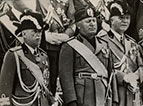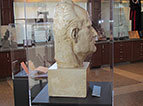The Rise of Fascism
It was really because of my strong sense of patriotism. I remember the disorder that reigned in Italy at the end of World War II. The country was paralyzed by strikes, farmers spread over the countryside snatching up land, the trains didn’t arrive on time, Italy had fallen in the clutches of socialists who were at the root of our social problems.
Internee Gentile Dieni on why he became a fascist, Fascism and the Italians of Montreal: An Oral History, 1922-1945
Fascism glorifies the state, nationalism, war, and empire. A right-wing political philosophy, it emerged in Italy towards the end of World War I.
In 1919, some Italians began to seize land and occupy factories in an attempt to assert worker control. As a result, wealthy landowners and industrialists called upon Prime Minister Giovanni Giolitti to restore order. When he failed to act decisively on the matter, these elites organized groups known as blackshirts – identified by the colour of shirt they wore. And these bands of blackshirts formed the basis of the Italian fascist movement. As the influence of fascism continued to grow in Italy – most notably after the March on Rome – Italian King Vittorio Emanuele III invited Benito Mussolini, leader of the National Fascist Party (PNF), to form a government in October 1922.
From its beginnings, Mussolini’s authoritarian regime used violence and murder to silence its critics. In 1924, members of the PNF assassinated Giacomo Matteotti, a socialist member of the Italian Chamber of Deputies, because of his anti-fascist speeches. Four years later, all other political parties were outlawed and freedom of the press ended.
The leaders of western countries seemed to ignore these realities. In the midst of the Great Depression, fascism seemed a powerful solution to ailing economies and the threat of socialism. In fact, Italy fared no better than other countries during the 1930s.
In his diary, William Lyon Mackenzie King described Mussolini as “a truly remarkable man of force of genius, fine purpose, a great patriot.” (The Diaries of William Lyon Mackenzie King, September 27, 1928, 271) And in the early 1930s, Winston Churchill called Mussolini the “Roman genius ... the greatest lawgiver among men.” (Winston S. Churchill, Volume V: Prophet of Truth, 1922-1939, 456-457)
These positive assessments of Mussolini changed after the invasion of Ethiopia in October 1935. In response, the League of Nations voted in favour of sanctions against Italy. The sanctions were largely ineffective.



